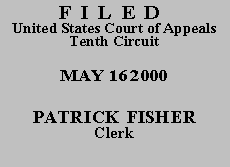

| ANNIE L. GORE,
Plaintiff-Appellant, v. KENNETH S. APFEL, Commissioner, Social Security Administration, Defendant-Appellee. |
|
Claimant Annie L. Gore appeals from the district court's affirmance of the Social Security Administration's denial of benefits. Claimant applied for supplemental security income benefits in 1995; that application was denied both initially and upon reconsideration. After a hearing, an administrative law judge (ALJ) issued a decision concluding that claimant was not disabled under the Social Security Act and denying benefits. The Appeals Council denied review.
Claimant brought suit in federal court. The magistrate judge recommended that the agency's denial of benefits be affirmed. After considering claimant's objections, the district court adopted the magistrate judge's recommendation. This appeal followed. On appeal, claimant argues that the agency failed to properly develop the record with regard to her respiratory impairment, and that the ALJ improperly substituted his own opinion for medical evidence in evaluating claimant's alleged mental impairment.
We have jurisdiction over this appeal by virtue of 42 U.S.C. § 405(g). Our review is limited to determining whether the agency's findings are supported by substantial evidence and whether the correct legal standards were applied. See Hawkins v. Chater, 113 F.3d 1162, 1164 (10th Cir. 1997). In light of these standards, and after a thorough review of the record on appeal, we affirm.
In order to determine whether a claimant is under a disability, the agency applies a five-step process. See 20 C.F.R. § 416.920; Williams v. Bowen, 844 F.2d 748, 750-52 (10th Cir. 1988) (discussing steps in detail). If a claimant is determined to be disabled or not disabled at any step, the evaluation process ends there. See 20 C.F.R. § 416.920(a). Here, the ALJ ended his evaluation at step four, concluding that, while claimant had severe impairments--namely borderline intellectual functioning, mild to moderate chronic obstructive pulmonary disease, and status post healed left leg gunshot wound, those impairments did not preclude her from return to her past relevant work as a poultry eviscerator. See Appellant's App., Vol. II at 16-17.
At step four, claimant has the burden to demonstrate that her impairments preclude her from performing her past relevant work. See Henrie v. United States Dep't of Health & Human Servs., 13 F.3d 359, 360 (10th Cir. 1993). Claimant challenges the ALJ's decision in connection with her respiratory impairment because the administrative record contains pulmonary spirometry test results for a person other than claimant. While she contends that such testing is required under agency regulations, she does not contend that the consultative physician did not perform the tests or that his opinion that her chronic obstructive pulmonary disease was only mild to moderate, contained in a report in the record, does not reflect her own test results. See Hawkins v. Chater, 113 F.3d at 1169. Additionally, she makes no showing that this impairment limits her residual functional capacity. She argues that her past work occurred in a refrigerated factory which, she asserts, aggravates her respiratory condition, but she did not raise this argument to the agency. Indeed, there is no evidence on the record that claimant considered her respiratory condition to limit her in any way, despite ample opportunity to report and discuss such limitations. Because claimant bears the burden at step four, her failure to make any showing that this impairment limits her residual functional capacity is fatal to her challenges.
Claimant also argues that the ALJ erred when he failed to acknowledge that she had an affective disorder as a mental impairment, despite the diagnosis of the consultative psychiatrist that she had bipolar affective disorder, and his opinion that she had deficiencies in concentration and episodes of deterioration. The ALJ properly rejected the bipolar affective disorder diagnosis because the consulting psychiatrist failed to identify any diagnostic criteria that claimant met which would support such a conclusion. A similar lack of evidence supports his statement that claimant had suffered frequent episodes of deterioration. The ALJ did credit the consulting psychiatrist's conclusion that claimant had deficiencies in concentration, although he concluded that she could still perform simple, one or two step tasks based on her daily activities.
We conclude that claimant's challenges to the agency's decision lack merit, that substantial evidence supports the agency's denial of benefits, and that the correct legal standards were applied. Accordingly, the judgment of the district court is AFFIRMED.
Entered for the Court
Circuit Judge
*. This order and judgment is not binding precedent, except under the doctrines of law of the case, res judicata, and collateral estoppel. The court generally disfavors the citation of orders and judgments; nevertheless, an order and judgment may be cited under the terms and conditions of 10th Cir. R. 36.3.